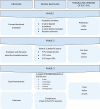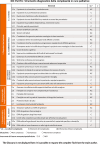Translation and Cross-Cultural Adaptation of the Instrument for the Diagnosis of the Complexity of Palliative Care Needs
- PMID: 40308712
- PMCID: PMC12040545
- DOI: 10.1089/pmr.2024.0065
Translation and Cross-Cultural Adaptation of the Instrument for the Diagnosis of the Complexity of Palliative Care Needs
Abstract
Background: In recent years, the palliative care (PC) paradigm is evolving from a prognosis-based approach to one centered on complexity, also in response to the aging population and the increase in chronic diseases. It is therefore necessary to strengthen PC networks with effective management of the specialist resources available. The use of tools such as the spanish Diagnostic Instrument for Complexity in Palliative Care (IDC-Pal) can help evaluate the complexity of PC needs, thus guiding the clinical care response. The aims of this study were the translation and the cultural adaptation of the IDC-Pal tool to the Italian language.
Methods: The methodology proposed by Beaton et al. and Sousa et al. was used for the translation and cultural adaptation of the IDC-Pal tool. Phase 1: a forward-backward translation with linguistic and cultural adaptation of the tool by two native Spanish translators and two native Italian translators, including two PC professionals and two nonprofessionals, was performed. Phase 2: the translation was evaluated by a panel of 12 Italian PC experts, who assessed the comprehensibility of the translated instrument, and proposed changes to the text, which was found to be incomprehensible to at least 20% of them. Phase 3: this version of the tool was proposed to a sample of the Italian target population (93 professionals including general practitioners, nurses, and hospital doctors at 9 Italian PC networks tested it on 168 patients in home and hospital settings), to evaluate its comprehensibility and usability. At the end of the experimental phase, a semi-structured interview was organized with the main researcher of each network, with the aim of receiving information about the comprehensibility of the tool. Finally, a definitive version was developed.
Results: The translation and adaptation were achieved without major problems.
Conclusions: A conceptually, culturally, and linguistically equivalent italian version of the original IDC-Pal was obtained.
Keywords: IDC-Pal; complexity; palliative care; patient needs; validation.
© The Author(s) 2025. Published by Mary Ann Liebert, Inc.
Figures
Similar articles
-
[Assessment of IDC-Pal as a Diagnostic Tool for Family Physicians to Identify Patients with Complex Palliative Care Needs in Germany: a Pilot Study].Gesundheitswesen. 2018 Oct;80(10):871-877. doi: 10.1055/s-0043-104215. Epub 2017 Jul 11. Gesundheitswesen. 2018. PMID: 28697523 German.
-
Italian Version of the YQOL-DHH Questionnaire: Translation and Cross-cultural Adaptation.OTO Open. 2021 Dec 12;5(4):2473974X211065433. doi: 10.1177/2473974X211065433. eCollection 2021 Oct-Dec. OTO Open. 2021. PMID: 34926977 Free PMC article.
-
The significance of exploring conceptual equivalence within the process of the cross-cultural adaptation of tools: The case of the Patient's Perception of Feeling Known by their Nurses Scale.J Nurs Scholarsh. 2023 Nov;55(6):1268-1279. doi: 10.1111/jnu.12910. Epub 2023 May 22. J Nurs Scholarsh. 2023. PMID: 37212367 Review.
-
The Spanish Adaptation of the Palliative Performance Scale (Version 2) Among Cancer Patients at the End of Life: Psychometric Properties.J Pain Symptom Manage. 2017 Oct;54(4):570-577.e5. doi: 10.1016/j.jpainsymman.2017.07.014. Epub 2017 Jul 14. J Pain Symptom Manage. 2017. PMID: 28712988
-
Complexity of patient care needs in palliative care: a scoping review.Ann Palliat Med. 2023 Jul;12(4):791-802. doi: 10.21037/apm-22-894. Epub 2023 Mar 16. Ann Palliat Med. 2023. PMID: 37038064
Cited by
-
Validation of a questionnaire to assess complexity of palliative care needs in primary care in Malaga, Spain: a study protocol.BMJ Open. 2025 Jul 17;15(7):e102040. doi: 10.1136/bmjopen-2025-102040. BMJ Open. 2025. PMID: 40675644 Free PMC article.
References
LinkOut - more resources
Full Text Sources


